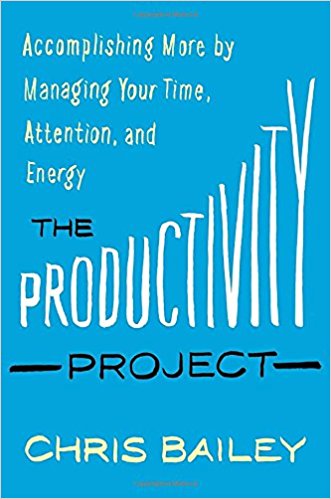The Productivity Project Summary

5 min read ⌚
 Proven Ways to Become More Awesome
Proven Ways to Become More Awesome
How many times have you been on the brink of success, only to find out that your plan is utterly useless?
If that’s not the case for you, then you’re probably lying.
We explore the main ideas behind The Productivity Project and more.
Who Should Read “The Productivity Project”? And Why?
When it comes to classification our hands are tied up, and we unwilling to conduct the process – meaning that this book is suitable for the broader audience.
“The Productivity Project” dives deep into discovering the reasons for adopting a habit to follow a pointless plan, with no end in sight.
Change that by embracing a different attitude that is complementary to your yearnings.
About Chris Bailey
 Chris Bailey is regarded as one of the modern experts in areas closely linked to productivity, efficiency, management and so forth.
Chris Bailey is regarded as one of the modern experts in areas closely linked to productivity, efficiency, management and so forth.
He has been an honorable guest and a consistent public speaker at the TED Talks series.
“The Productivity Project Summary”
As it’s with most things, the Internet and the abundance of information available today can lead people astray because they are exposed to untrustworthy productivity lessons.
For instance, doing more in lesser time is not equal to being productive.
Smart people merely focus on the tasks or assignments that can make a difference.
So, what is the starting point?
First things first, it’s best if you compare two profoundly opposite parties and investigate their movement and ideas.
Take a businessperson with a promising future – a hyperactive individual and a Monk, or a Buddhist spiritual teacher. So, what road shall you take?
The author suggests that a person ought to be in the middle of these two. In other words, find the perfect balance, don’t stand at the side – doing anything, with no plan to follow.
Let’s continue with our story, shall we?
The ambitious person or in this case, the businessperson embraces a fast-living tempo. That individual is always on the lookout for a way to pass on its intentions to the rest of the group.
On the spur of the moment, these persons have little time to think twice, before they take action.
In the meantime, a monk – despite other activities, spends most of its time in peace and harmony with itself and the world, doing something deeply meaningful and life-altering.
From a financial standpoint, the monk is not doing anything worthy, but in practice, the peacefulness arousing from such non-doing has effects upon the world.
How to choose your path, and cling to the right approach in order to gain momentum?
Measure twice, cut once! In general, people love to skip to the part, where a specific strategy is launched, without proper planning and defining the ultimate destination.
Create healthy habits and establish a productive routine to finally get a secure grip on the thing you crave for!
Don’t become aversive towards mistakes, because making an error is only bad if you fail to recognize the consequences of it. In the meantime, ask yourself – What would I do, if I had 2-3 extra hours each day?
Your reaction or response will merely give you a clue of serious are you – regarding the intention to reach higher productivity.
See, let’s stick to the old-classic mentality – Don’t go anywhere without planning a route, and designing a blueprint! You’ll be lost without it, and thus you’ll get fewer things done.
The author distinguishes the Rule Number 3, as a result of its easy-to-follow methodology and effectiveness.
All you have to do is define three goals you’d like to accomplish on a weekly basis and apply the same strategy day in and day out.
It might sound as though you can easily synchronize your busy schedule with these goals, but you’ll soon see why people fail right after facing their first obstacle.
It requires mental resilience, new energy, and freshness if you insist on maintaining such tempo. However, one thing is for sure: if you are able to sustain this high rhythm, the boost on a personal and professional level will be inevitable.
What is the main threat? – Choosing unrealistic, and highly optimistic goals can cost you. Dedicate yourself to something that is not off the table and believe in your ideas.
Once more, we return to the habit of procrastination, which is some sort of a mental disease that stroke the world and continues in the same fashion.
The resources you have at your disposal are not unlimited, take notes, and understand that your time is valuable.
Don’t be enslaved by some meaningless agenda that promotes “the pursuit of success” while running around like a lunatic.
Make up a list, of all the things you would like to erase from your brain and start with the implementation. It doesn’t take too much to do it, and it’s proven to be of particular use to all people.
If such attitude doesn’t accommodate your ideas, there’s another equally effective technique to free yourself from bondage. Engage yourself in completing the assignments the minute they appear.
Don’t delay and sail through the tasks with power and determination.
Key Lessons from “The Productivity Project”
1. Find your perfect method
2. Don’t waste any time on trivial tasks
3. Help yourself, and don’t allow a single doubt to enter your mind
Find your perfect method
Unfortunately, we cannot enlighten you with a formula that works in every case.
You have to follow simple ground-rules to find the perfect recipe that leads to positive results.
Evaluate the effects of your actions, and never lose hope!
Don’t waste any time on trivial tasks
Make the most out of your resources, by shifting your attention to things that are worthy of your efforts and dedication.
Do your best in every situation, and don’t be afraid to take full control over your life.
Passing the blame onto someone else is the worst attitude one can embrace.
Help yourself, and don’t allow a single doubt to enter your mind
Evidently, some assignments seem more boring than the others, but that’s not a valid excuse for stepping aside.
Turn the situation in your favor, by making the problem or task seem more appealing.
You can add a reward at the end of it or motivate yourself by acknowledging that the execution of that particular task can help you to overcome other challenges down the road.
Like this summary? We’d Like to invite you to download our free 12 min app, for more amazing summaries and audiobooks.
“The Productivity Project Quotes”
Busyness is no different from laziness when it doesn’t lead you to accomplish anything. Share on X We find the internet and multitasking so stimulating because they’re candy for our limbic system. Share on X Many people forget that their smartphone, computer, and other devices exist for their convenience—not the convenience of everyone who wants to interrupt them throughout the day. Share on X The average knowledge worker opens his or her email program fifty times a day and uses instant messaging seventy-seven times a day. Share on XOur Critical Review
What have we learned from this lesson?
Unfortunately, tomorrow is not enough, especially if you plan to conquer the world.
Do it now, at this moment, stop with the procrastinate at once.








